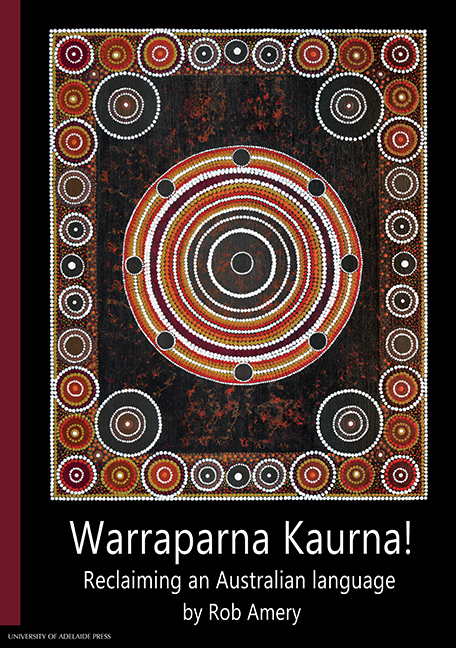Book contents
- Frontmatter
- Contents
- Maps, Plates, Graphs and Tables
- Preface to this Edition (2016)
- Foreword to the 2000 Edition
- Preface to the 2000 Edition
- Acknowledgements
- Abbreviations
- Conventions and Terminology
- Chapter 1 Locating the Study
- Chapter 2 Language Reclamation
- Chapter 3 An Ecological Approach to Language Revival
- Chapter 4 A Sociolinguistic History of Kaurna
- Chapter 5 Kaurna Sources
- Chapter 6 Restoring and Transforming the Kaurna Language
- Chapter 7 Kaurna Language Programs
- Chapter 8 Kaurna in Society
- Chapter 9 Kaurna Language Revival: The Formulaic Method
- Chapter 10 Sociopolitical Dimensions of Kaurna Language Revival
- Chapter 11 Into the Twenty-first Century: Developments since 2000
- Chapter 12 Summary and Conclusions
- Bibliography
- Index
Chapter 1 - Locating the Study
Published online by Cambridge University Press: 28 July 2017
- Frontmatter
- Contents
- Maps, Plates, Graphs and Tables
- Preface to this Edition (2016)
- Foreword to the 2000 Edition
- Preface to the 2000 Edition
- Acknowledgements
- Abbreviations
- Conventions and Terminology
- Chapter 1 Locating the Study
- Chapter 2 Language Reclamation
- Chapter 3 An Ecological Approach to Language Revival
- Chapter 4 A Sociolinguistic History of Kaurna
- Chapter 5 Kaurna Sources
- Chapter 6 Restoring and Transforming the Kaurna Language
- Chapter 7 Kaurna Language Programs
- Chapter 8 Kaurna in Society
- Chapter 9 Kaurna Language Revival: The Formulaic Method
- Chapter 10 Sociopolitical Dimensions of Kaurna Language Revival
- Chapter 11 Into the Twenty-first Century: Developments since 2000
- Chapter 12 Summary and Conclusions
- Bibliography
- Index
Summary
Some people have described Kaurna language as a dead language. But Kaurnapeople don't believe this. We believe that our language is a living language andthat it has only been sleeping, and that the time to wake it up is now and this iswhat we're doing.
(Cherie Watkins in Warranna Purruna video DECS, 1997)This book tells the story of the renaissance of the Kaurna language, the language of Adelaide and the Adelaide Plains in South Australia. It is based on a longitudinal study conducted between 1989 and 1997, which resulted in a PhD thesis submitted to the University of Adelaide in June 1998. It chronicles and analyses the efforts of the Nunga community, and interested others, to reclaim and relearn a linguistic heritage on the basis of mid-nineteenth-century materials. In particular the study focuses on a small Aboriginal school in the northern suburbs of Adelaide and the adjoining secondary school, and the work of several committed and hard-working Nunga language specialists. This longitudinal study documents in detail the very earliest stage of the attempted revival of a language long considered ‘dead’ or ‘extinct’. The Kaurna language has probably not been used as an everyday language of communication for well over a century. As far as is known, the ‘last speaker’, a woman known as Ivaritji or Amelia Taylor, died in 1929 (Gara, 1990: 100). There are no sound recordings of the language as it was spoken last century, though limited printbased materials do exist. Kaurna people are a small minority dispersed across a large metropolitan city and throughout surrounding country towns and Aboriginal communities. On the face of it, reclamation of the Kaurna language is undertaken against seemingly insurmountable odds, yet with positive results, at least according to some criteria.
I cannot in any sense claim this to be a neutral account of the reclamation of the Kaurna language, since, as a non-Aboriginal Australian, I am one of the main protagonists of the language revival efforts and have been involved with it on a practical level since 1989. However, the study does claim to be an informed one. I have attempted to take differing perspectives into account and to represent the full spectrum of views expressed to me and to other observers, but I admit I am partisan in the views I express.
- Type
- Chapter
- Information
- Warraparna Kaurna!Reclaiming an Australian language, pp. 1 - 18Publisher: The University of Adelaide PressPrint publication year: 2016



